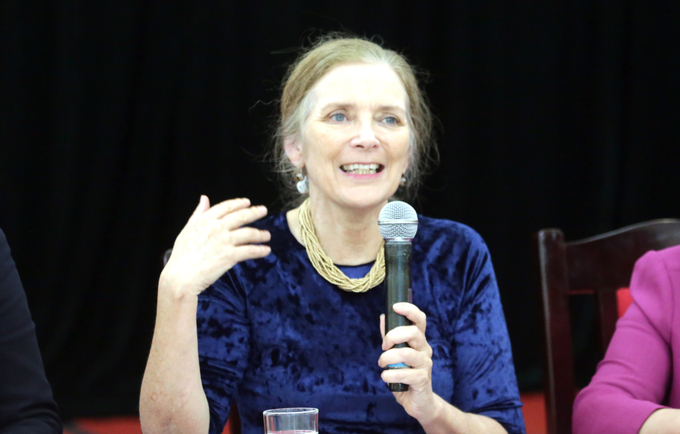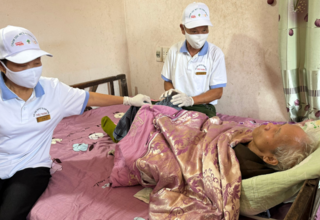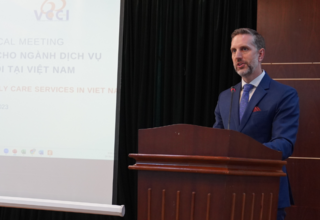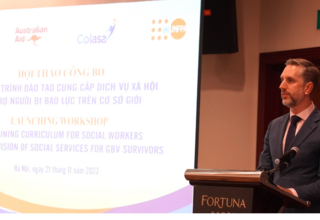Ms. Pham Thi Hai Chuyen, Former Minister of Labour, Invalids and Social Affairs/ Chairperson of the Viet Nam Committee for Older Persons;
Mr. Nguyen Van Tien, Former Vice Chairman of the Parliamentarian Committee for Social Affairs;
Mr. Rintaro Monri, Technical Advisor on Population Ageing and Sustainable Development, UNFPA APRO;
Representatives of line ministries, government organizations, civil society organizations, the media and my fellow UN colleagues;
A very good morning to all of you,
It is my great pleasure to open this event together with Ms. Nguyen Thi Ha, Vice Minister of Labour, Invalids and Social Affairs. Let me at the outset thank the Viet Nam National Committee on Ageing, for co-hosting and co-organizing today’s workshop to share key findings from a new report “Towards a comprehensive national policy for an ageing in Viet Nam". This report, a joint publication between the Viet Nam National Committee on Ageing and UNFPA in Viet Nam, analyzes population ageing in Viet Nam and its impacts and provides policy suggestions necessary for responding to this demographic trend.
Ladies and gentlemen,
We are all getting older. This is a fact of life.
One in nine persons is aged 60 or older. This is projected to increase to one in five by 2050.
Between 2015 and 2030, the target date for achieving the Sustainable Development Goals, the number of older persons worldwide is set to increase by 56 per cent—from 901 million to more than 1.4 billion. By 2030, the number of people aged 60 and above will exceed that of people aged 15 to 24.
In Viet Nam, the proportion of older persons in the total population has increased to 11.9 per cent in 2017, and will be doubled to almost 20 per cent by 2035.
As all of you know, the 2019 Census on Population and Ageing will be launched next week on 1 April 2019 and I hope we will have the most updated number of older persons by end of this year.
As the world sets out an inspirational new development agenda, and commits to reaching the new Sustainable Development Goals, Viet Nam must envision a new paradigm that aligns demographic ageing with economic and social growth and protects the human rights of older persons.
Ageing is a triumph of development. We must now turn our focus from merely helping people reach old age to helping them reach a happy old age.
Distinguished guests,
Rapid population ageing has increasing impacts on socio-economic development and affect all population groups, which require relevant policy responses. The increasing of both percentage and absolute numbers of older persons require significant re-structuring of the society from all aspects, such as financial investment, public spending, urban and rural planning, etc...
As people age, there is increasing risk of social exclusion faced by older persons, which means being denied full access to various opportunities and resources that are normally available to the population: access to adequate employment, income, health care and housing and opportunities to participate equally with in social, political and community activities. This could lead to failure in achieving the SDGs and the aim of “Leaving no one behind”.
Further, while the concern is mainly the older population, ageing is not only about older persons, it starts to affect everyone. For example, issues faced by young people as a result of increasing population of the older persons have to be addressed as well, for example: working women having elderly to take care of at home should be given some leave and concessions to be able to do that. Therefore, responding to population ageing doesn’t mean addressing the expectation and needs of older population only, but it will require a more comprehensive approach to address the need of all population groups in preparing to an aged future.
Ladies and gentlemen,
The report we launch today analyzes population ageing in Viet Nam and its impacts. It also suggests policy to respond to that demographic trend. There are several sections focusing on:
• The trends in fertility and mortality both past and projected;
• Impact on population ageing and the increasing significance of older persons as the fastest growing cohort;
• Emerging issues as a result of population ageing;
• Review what actions the Government has been taking and drawing on relevant lessons from other countries; and
• Recommendations on how to address the ageing-related issues through a comprehensive approach and policy and the way forward.
It is great that my colleague from UNFPA APRO, Mr. Rintaro Monri will have a presentation on life-cycle approach and international experience in responding to population ageing.
Distinguished guests,
As we step towards the better future we all want, ‘leaving no one behind’ will mean making space for the contributions of older persons. Let us promote the rights and ensure the full participation of older persons to build better societies for all ages.
I believe that by joining forces and working together, we truly can make a difference and help promote meaningful responses to population ageing – responses based on values of non-discrimination and equality that advance the vision of a vigorous, happy and healthy old age.
It has been a genuine pleasure to witness the close collaboration between MOLISA and UNFPA over the past years. I would also like to thank again the Viet Nam National Committee on Ageing for its superb collaboration – and to thank all of you for committing your time to come and discuss at this event, which will have an impact on the well-being and happiness of elders in Viet Nam for years to come.
Xin cam on.




